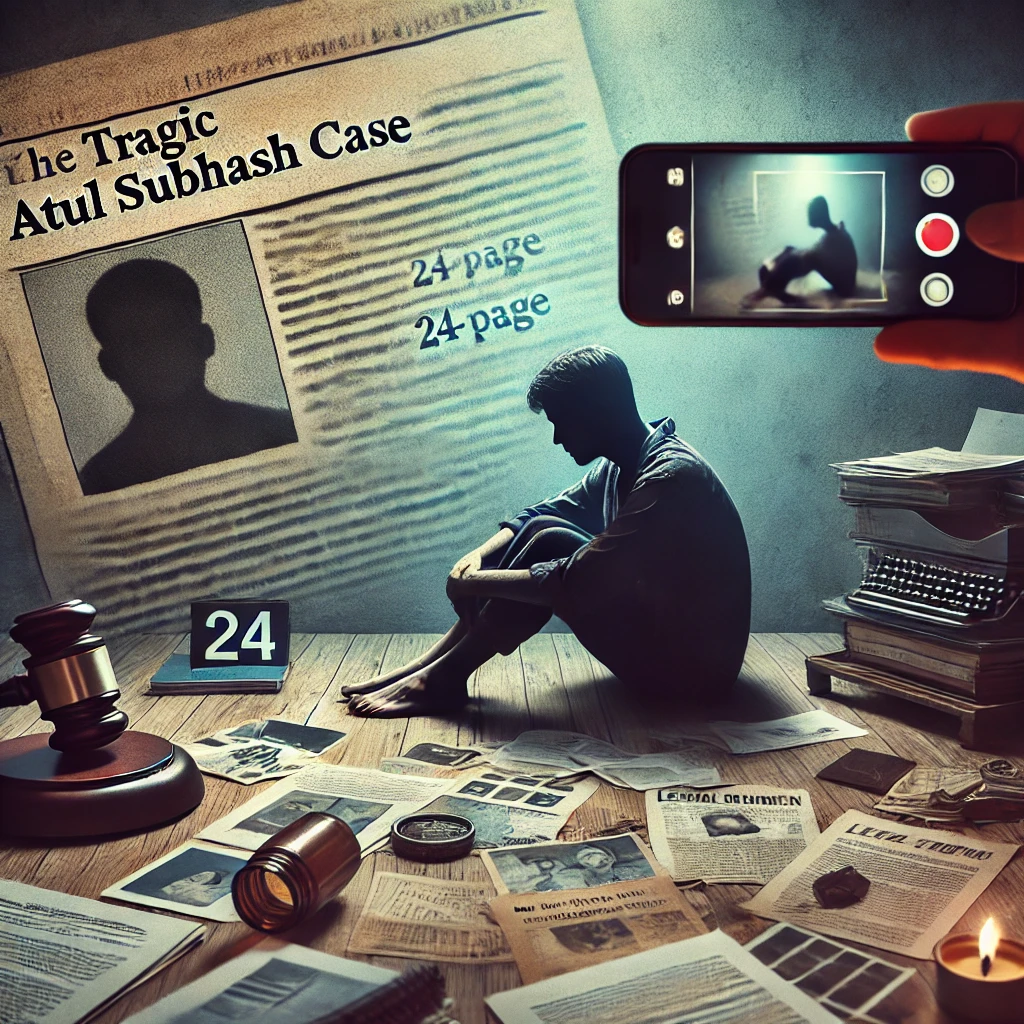Introduction: A Story That Shocked the Nation
On a quiet December morning in 2024, the tragic news of Atul Subhash’s death shook the nation. Atul, a 34-year-old tech professional from Bengaluru, was found lifeless in his apartment. What initially appeared to be another isolated case of personal despair soon unfolded into a storm of allegations, legal battles, and heated debates around harassment, misuse of laws, and the deep cracks in relationships.
Atul’s 24-page suicide note and a heart-wrenching video, recorded just before his death, brought forward accusations of harassment and extortion by his estranged wife, Nikita Singhania, and her family. This case is not just about one man’s tragic end but a reflection of societal issues, misuse of legal frameworks, and the urgent need for balance in gender equality laws.
Let us dive into the full story, examine its implications, and understand why this incident has ignited conversations nationwide.
Table of Contents
Who Was Atul Subhash?
Atul Subhash was a hardworking, middle-class professional working in Bengaluru’s competitive tech industry. Originally from Maharashtra, Atul was described by friends and colleagues as a cheerful, ambitious, and family-oriented man. Like many young professionals, he worked hard to build a stable life for himself and his loved ones.
However, behind his outward success, Atul was allegedly dealing with personal turmoil in his marriage. His separation from his wife, Nikita Singhania, was marred by constant legal battles and emotional strain, ultimately pushing him to a breaking point.
The Events Leading to the Tragedy
1. A Marriage Turned Sour
Atul Subhash’s marriage with Nikita Singhania, initially a promising union, started to deteriorate over time. While the specific reasons behind their strained relationship remain private, Atul’s note and video pointed toward constant disagreements and family interference.
2. Allegations and Legal Battles
Following their separation, things escalated quickly. Atul faced multiple allegations, including:
- Dowry Harassment: Section 498A of the IPC was invoked, a law meant to protect women from cruelty and harassment related to dowry demands.
- Unnatural Acts: Nikita accused Atul of unnatural sexual behavior under Section 377 of the IPC.
- Financial Extortion: According to Atul’s claims, his wife and in-laws demanded ₹3 crore to settle the cases against him. Additionally, ₹30 lakh was allegedly demanded for granting visitation rights to their son.
These accusations, combined with the financial and emotional toll of prolonged legal proceedings, left Atul feeling cornered and helpless.
3. Atul’s Final Words
Before taking the extreme step, Atul left behind a detailed 24-page suicide note and a video. In these final messages, he described:
- The emotional torment he faced.
- How the legal system was allegedly being misused against him.
- Specific accusations against his wife, Nikita, and her family for extortion and false allegations.
- His heartbreak over being separated from his son.
Atul’s words struck a chord with many, sparking a nationwide discussion about the misuse of protective laws and the challenges men face in such disputes.
The Aftermath: Legal Actions and Arrests
Following Atul Subhash’s death, the Bengaluru Police acted swiftly:
- A case of abetment to suicide was filed against Nikita Singhania and her family under Section 306 of the IPC.
- Nikita was arrested in Gurugram, Haryana, while her mother, Nisha Singhania, and brother, Anurag Singhania, were detained in Prayagraj, Uttar Pradesh.
- The Singhania family has since been remanded to judicial custody, with further investigations ongoing.
While the legal proceedings continue, the case has highlighted the need for a fair and balanced examination of such allegations.
The Larger Debate: Misuse of Laws or Genuine Protection?
Atul Subhash’s case has reignited the debate surrounding the misuse of protective laws like Section 498A (dowry harassment) and Section 377. These laws were originally enacted to protect vulnerable individuals, particularly women, from abuse and exploitation. However, the Supreme Court of India has previously acknowledged that these laws can sometimes be weaponized for personal vendettas.
Key Issues Highlighted:
- False Allegations: Atul’s case underscores how serious allegations, if misused, can ruin reputations, careers, and lives.
- Financial Extortion: The claims of monetary demands in exchange for withdrawing cases have sparked concerns about the ethical misuse of legal provisions.
- Mental Health Impact: Legal and emotional battles can severely impact mental health, as seen in Atul’s tragic decision.
Real-Life Stories That Echo Atul’s Struggle
While Atul’s case has gained significant media attention, it is not an isolated incident. Similar stories have emerged across the country, where individuals have taken extreme steps due to prolonged harassment and legal complications.
- In 2017, the Supreme Court observed that misuse of Section 498A had become a growing concern and issued guidelines to prevent its abuse.
- In 2022, the National Crime Records Bureau (NCRB) reported that nearly 30% of cases filed under Section 498A ended in acquittal or were deemed false, leading to discussions about reforms.
These incidents reflect the complex reality of family disputes and the need for balanced laws that protect genuine victims without enabling misuse.
The Role of Mental Health in Legal Battles
One of the most critical lessons from Atul Subhash’s case is the importance of mental health. Legal disputes, false allegations, and family issues can take a heavy toll on an individual’s emotional well-being.
Mental Health Support is Crucial:
- Open communication with family and friends can provide emotional relief.
- Seeking professional counseling or therapy should not carry a stigma.
- Society must recognize the impact of mental health struggles, particularly in high-pressure situations like Atul’s.
A Call for Reform: Justice and Fairness
The tragic death of Atul Subhash is a wake-up call for society and the judicial system. While laws protecting women are absolutely essential, there is an urgent need to:
- Prevent Misuse: Introduce stricter checks to ensure that laws like Section 498A are not exploited.
- Gender-Neutral Laws: Family disputes and harassment cases should be treated impartially, with fairness for all parties involved.
- Legal Support for Men: Establish support systems for men facing false allegations and emotional harassment.
- Promote Mediation: Encourage alternative dispute resolution methods like counseling and mediation to resolve conflicts amicably.
A Tragedy That Demands Change
The Atul Subhash case is not just the story of one man but a reflection of deeper issues in our legal and societal systems. Atul’s heartbreaking decision has sparked an important conversation about fairness, justice, and the need for reform. While we mourn his loss, we must also learn from it and work toward creating a society where laws protect the vulnerable without being misused.
For individuals facing similar challenges, remember that there is always hope and help available. Reach out to friends, family, or mental health professionals—you are never alone.
Let this story be a catalyst for awareness, empathy, and change. If you have thoughts, experiences, or ideas about how to create a fairer system, share them in the comments below.
You may also like to read: https://360jankari.com/top-10-high-paying-jobs-in-india-for-2025/



